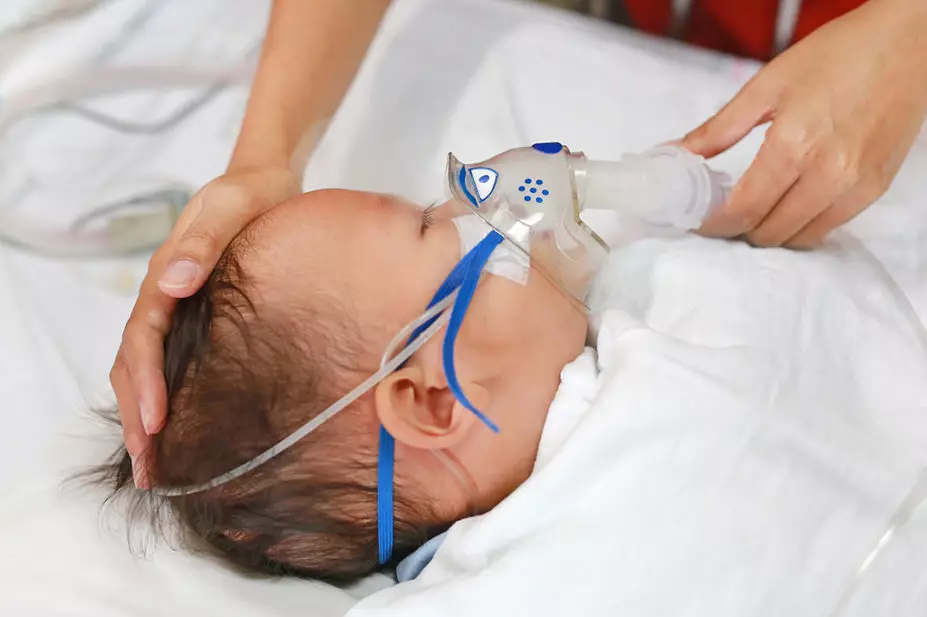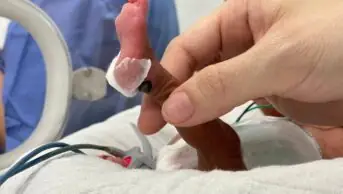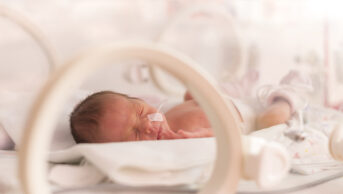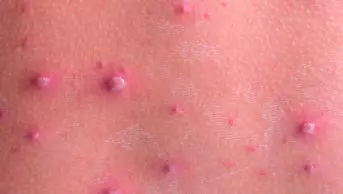
Shutterstock.com
A single injection of the monoclonal antibody nirsevimab could protect healthy infants from lower respiratory tract infections caused by respiratory syncytial virus (RSV) for one year, a study has found.
If approved, it would be the first potential immunisation for all infants against RSV, which causes deaths of around 30 babies per year in the UK.
The phase III study, published in the New England Journal of Medicine on 2 March 2022, randomised 1,490 healthy infants in their first year of life to receive either a single intramuscular injection of nirsevimab or placebo.
The injections were administered before the start of the RSV season, which is generally prevalent between October and March each year, and followed up for 150 days.
At 150 days after the injection, RSV-associated lower respiratory tract infection requiring attention from a medical professional had occurred in 12 infants (1.2%) in the nirsevimab group and 25 infants (5.0%) in the placebo group.
The researchers calculated that this result corresponded to an efficacy of 74.5% (95% confidence interval [CI], 49.6 to 87.1; p<0.001) for nirsevimab, against ‘medically-attended’ lower respiratory tract infection caused by RSV.
Overall, six infants in the nirsevimab group were hospitalised with RSV (0.6%), compared with eight infants (1.6%) in the placebo group.
In the UK, currently only at-risk infants — such as those born at less than 35 weeks gestational age, or in those aged under 2 years who have received treatment for bronchopulmonary dysplasia or haemodynamically significant congenital heart disease — are offered a five-dose regimen of the monoclonal antibody palivizumab.
However, the authors note that there is “serious unmet medical need” for RSV protection in healthy infants born at term.
William Muller, scientific director of clinical and community trials at Stanley Manne Children’s Research Institute at Ann and Robert H Lurie Children’s Hospital of Chicago and principal investigator of the study, said: “These exciting data show that nirsevimab has the potential to offer RSV protection for all infants, which would be a paradigm shift in the approach to this disease.
“We know that RSV has seen a resurgence with the easing of COVID-19 public health measures. This shows us a broad immunisation approach is needed to help mitigate the substantial global burden RSV places on infants, their families and healthcare services.”
Dan Hawcutt, practising consultant paediatric clinical pharmacologist, said RSV was a “significant” cause of admission to hospital for infants, in particular those aged six months and under.
“Prior to COVID-19, and likely in the future, it has been seasonal in nature, with large peaks in the winter months resulting in admissions to the wards and intensive care units, across Britain and the world,” he said.
“The risk is greatest in infants with additional risk factors, such as prematurity, neuromuscular disease or other chronic disease.”
Hawcutt said that the risks and benefits of nirsevimab would have to be “carefully scrutinised” by national bodies, such as the Joint Committee on Vaccinations and Immunisations (JCVI), to establish if the treatment would be of “net benefit” if rolled out.
“As the treatment is given by intramuscular injection, like a vaccination, the discomfort, potential side effects and cost of rolling out such a programme will have to be considered against the benefits described,” he continued.
“However, this still represents a significant development in the road to RSV prevention, and coupled with the clinical trials of RSV treatments going on at the moment, it is an exciting time in the treatment of this serious illness in babies.”
Steve Tomlin, chief pharmacist at Great Ormond Street Hospital, said his trust has been “using palivizumab in vulnerable infants for many years now”.
“It is, however, only used in the most vulnerable and not in all infants for which it is licensed.”
As a single dose offering extended protection from RSV, Tomlin highlighted that nirsevimab represents “a great advance for health care services, and even greater advance for developing countries”.
In August 2021, the JCVI recommended that nirsevimab be considered for the prevention of RSV in certain groups of young children.
Minutes from a meeting of the Joint Committee on Vaccination and Immunisation (JCVI), held on 22 June 2021, noted that the long-lasting monoclonal product “looked promising” and only required a single dose for the entire RSV season.
JCVI members agreed that “all efforts” should be made to explore the potential use of the new monoclonal antibody for the “coming winter”.
You may also be interested in

Neonatal sepsis: prevention and management

NHS to start routinely offering blindness drug to premature babies
